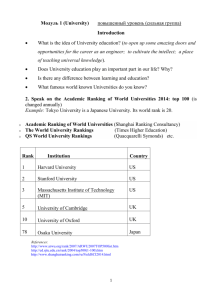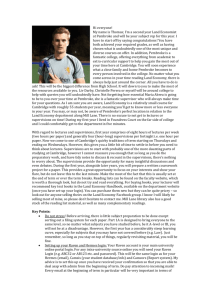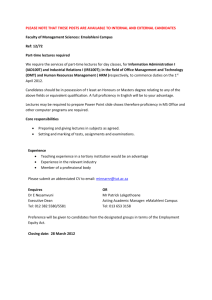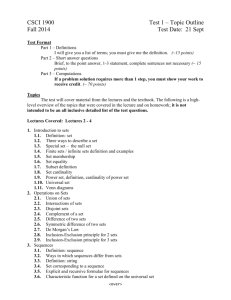University
advertisement
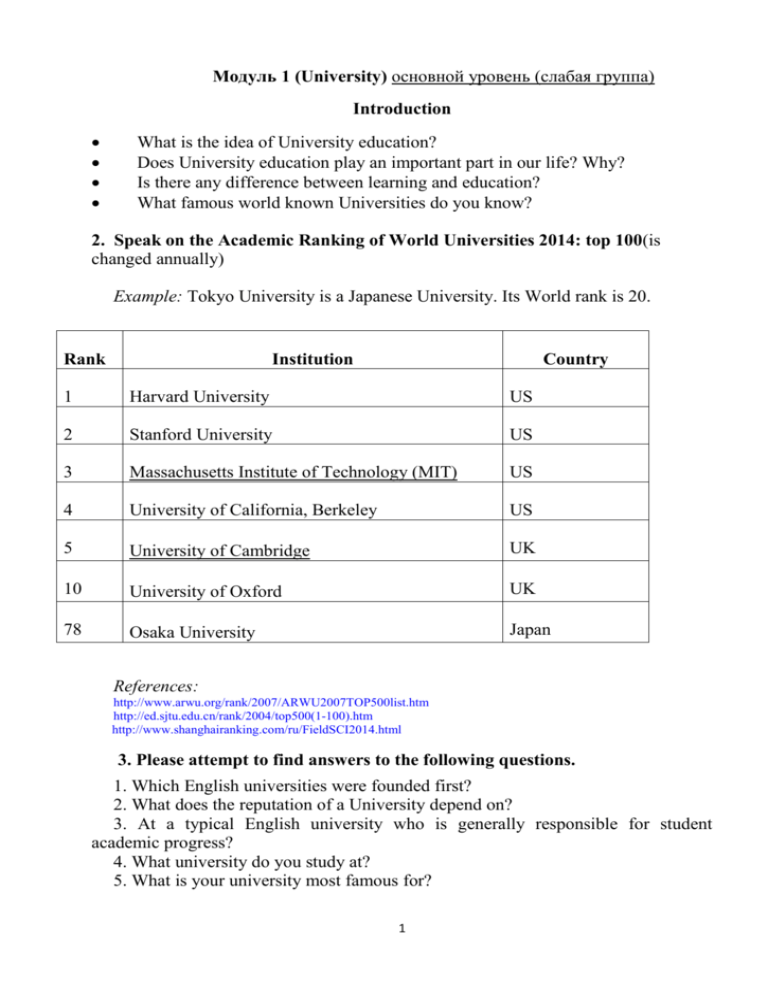
Модуль 1 (University) основной уровень (слабая группа) Introduction What is the idea of University education? Does University education play an important part in our life? Why? Is there any difference between learning and education? What famous world known Universities do you know? 2. Speak on the Academic Ranking of World Universities 2014: top 100(is changed annually) Example: Tokyo University is a Japanese University. Its World rank is 20. Rank Institution Country 1 Harvard University US 2 Stanford University US 3 Massachusetts Institute of Technology (MIT) US 4 University of California, Berkeley US 5 University of Cambridge UK 10 University of Oxford UK 78 Osaka University Japan References: http://www.arwu.org/rank/2007/ARWU2007TOP500list.htm http://ed.sjtu.edu.cn/rank/2004/top500(1-100).htm http://www.shanghairanking.com/ru/FieldSCI2014.html 3. Please attempt to find answers to the following questions. 1. Which English universities were founded first? 2. What does the reputation of a University depend on? 3. At a typical English university who is generally responsible for student academic progress? 4. What university do you study at? 5. What is your university most famous for? 1 4. Consult the Internet” Google Earth Maps” (the University of Cambridge location). Consult “You Tube” (the University of Cambridge (Movie) http://www.youtube.com/watch?v=NX3BOyyL7zg Vocabulary сollege ( n ) высшее учебное заведение (небольшой университет) или часть большого университета (факультет). tutor (n) руководитель образовательной программы, академический наставник, закрепляемый за студентом или группой студентов для консультирования по вопросом, связанным с изучаемым учебным материалом supervision (tutorial) n 1.форма обучения в малых группах путем прикрепления студентов к отдельным консультантам; 2. семинар, групповое занятие по разбору пройденного материала. course( n ) специализация, учебный курс занятий (обычно рассчитанный на семестр) subject( n ) предмет обучения, специальность undergraduate 1.общее название для бакалаврских программ; 2.студент бакалавриата graduate студент магистерской программы, имеющий степень бакалавра и продолжающий обучение. the lecture theatres лекционные аудитории in advance заранее specialist area направление подготовки, специализация to offer courses предлагать курсы to award а degree присваивать квалификацию to enroll students зачислять студентов to suggest books рекомендовать литературу to conduct research проводить исследование to be academically быть плодотворным с педагогической точки зрения, быть challenging более трудным to raise issues поднимать проблемные вопросы to attend supervision посещать семинар \ консультацию to be allocated to a прикреплять к консультанту supervisor academic progress успеваемость to set assignments давать задания as well as также Text 1 A. The University of Cambridge 2 Skim Text 1A and find answers to the following questions and then listen to the recording: 1. How many colleges are there in Cambridge? 2. What is the university in charge of? 3. Why is a tutorial more academically challenging than a standard lecture? 4. Who holds the university teaching appointments? 5. What kinds of students are there at any college in Cambridge? The University of Cambridge was founded at the beginning of the 13-th century. The university is made up of 31 self-governing colleges. The university has no city campus. The lecture theatres, libraries and laboratories are located in separate colleges throughout the city. The University of Cambridge is the central administration that awards degrees to students. The colleges organize the teaching of students. Each college enrolls students, who usually live and study within their colleges. The teaching within the colleges is based on an individual or small group system. At the University of Oxford these teaching sessions are called 'tutorials' and at Cambridge 'supervisions. The idea of tutorial system is: each student is allocated to a tutor. A tutor plans the students' work, discusses academic progress sets assignments to be undertaken. The supervisor also suggests the books the students should read. Each week, or more frequently, students attend their supervisions. The supervisor discusses and criticizes the work the students have completed. Each supervision requires students to prepare work in advance. The supervisions are more academically challenging than a lecture because students communicate, raise issues, analyze and criticize the ideas. Professors normally do not undertake much undergraduate teaching as they conduct research in their own specialist areas. In one college there will be students studying law, geography, medicine and engineering, as well as all the other subjects offered within the university. Since the beginning of the 20th century more than 90 university members have won Nobel prizes. Reading and Speaking Activities Exercise 1.Text 1A. Find the answers in the right hand column. 1. What makes the University of Cambridge different from most other English Universities? a. conduct research 2. Why are the supervisions more academically challenging than a standard lecture? b. the tutorial system students are taught in small groups 3 3. What is a supervisor in charge of? c. once a week or more frequently 4. How often do students attend their supervisions? d. students raise issues, analyze and criticize the ideas in discussion 5. What issues are generally discussed at supervisions? e. the work completed and academic progress 6. What is a student required to undertake for each supervision? f. a wide range of subjects: law, medicine, engineering etc. 7. The university professors do not undertake much undergraduate teaching. What kind of work do they do? g. assignments to be undertaken by the students 1 2 3 4 5 6 7 8 Exercise 2. From the list of actions below, choose those performed by the students and by the tutors and those within the university responsibility. Inform the audience what a tutor is usually in charge of (in 5-7 sentences). to make notes, to undertake assignments, to attend lectures, to raise issues, to attend supervisions, to write essays, to award degrees, to arrange lectures, to teach students in small groups, to criticize the work completed, to discuss academic progress, to allocate to a tutor, to offer courses, to enroll students, to suggest books Student Tutor University Exercise 3. Speak on the University of Cambridge according to the scheme: 4 Exercise 4 . Express your point of view whether the tutorial system has a great value or not . Example: I believe I don’t think To my mind that the tutorial system has a great value . - is beneficial for all students. - is useful and helpful. - it is wasting of time and money. -it provides them with ideas how to realize the academic potential better. - it allows the students to discuss , analyze and share the ideas with the tutor - it permits the students to communicate in groups. Grammar Exercise 5. Open the brackets and write the verbs in the proper tense forms. 1. Не often (to show) ___________ a new equipment in the laboratory. 2. Не (to show) ___________ a new equipment in the laboratory tomorrow. 3. Не (to show) ___________ a new equipment in the laboratory last week. 4. This University (offer) ______ many courses ten years ago. 5. The supervisor (teach) __________ undergraduates in small groups last year. 6. Students (demonstrate) _________ new device in the laboratory yesterday. 5 7. At the lecture last Monday they (make notes) _________ to explain the phenomenon. Exercise 6. a) Make up all types of questions in Present Simple Undergraduates attend lectures in physics every Friday. b) Make up all types of questions in Past Simple The undergraduates attended lectures in physics last Monday. c) Make up all types of questions in Future Simple Our lecture in Physics will begin at 9 a.m. next week. Exercise 7. Open the brackets and write the verbs in the proper tense form. 1. Не often (to show) ___________ a new equipment in the laboratory. 2. Не (to show) ___________ 3. Не to show) ___________ a new equipment in the laboratory tomorrow. a new equipment in the laboratory last week. 4. A college as a rule (to provide) __________ facilities, food and accommodation for students. Exercise 8. Put the following sentences into Passive . Model: People speak English is spoken in Europe English in Europe. Part A 1. A large number of people in the world use English as the international language. 2. Our University enrolled 2000 students last year. 3. The enrolment office admits students to the University in August. 4. This University will offer many courses. 5. The teachers hold lectures on the University campus. 6. The University provides students with facilities. 7. The departments teach students in small groups (tutorials). 8. The University awarded degrees in May. 9. The University will arrange examinations for students at the end of June . Part B 11.Colleges provide accommodation and food. 12. Undergraduates attend lectures and tutorials. 13. Students will discuss the work with their tutors. 14. Junior students choose their majors, normally at the end of the first year. 15. Every college involved many students in sports last year. 16. Professors engage senior students in research. 6 17. Tutors will suggested the books to read for a particular course. 18. Professors assess student academic achievements. 19. Professors usually carry out investigations. 20. Most European Universities give lectures in English. Exercise 9.Translate the Russian words below into English, using the Present /Past/ Future Simple (Passive Voice). 1. Many exams оцениваются from 1 to 100 points. 2. Courses and seminars предлагались by various departments. 3. Students зачисляютсяby colleges. 4. Professors назначаются to carry out research. 5. Students будут обучаться by faculty fellows or tutors in small groups. 6. The internship is generally оплачивается and проводится in the second and fourth year of study. Exercise 10. In the text below fill in the gaps using the verbs in their Active or Passive forms. 1. Cambridge (like Oxford) can _____(picture) as a collection of colleges, each of which ______(have) its own character and individuality. 2. The Supervision System where students _______ (receive) tuition in small groups ______ (regard) as one of the best teaching models in the world. 3. Each student ______(have) a tutor who practically _______(guide) him through the whole course of studies. 4. The Head of Studies ______(appoint) by the college to look after you academic progress, while the role of the tutor mainly ______ (concern) in protecting student’s interests and helping him or her in domestic college matters. 5. The University teaching ______(consist of) lectures and practical work, but much of time ______ (spend) in seminars and tutorials. 6. A significant part of undergraduate education ______ (hold) in university buildings. 7. Cambridge University is a leading international center and many postgraduates actively ______ (engage) in research work. Text 1 B. Our University Vocabulary: to be famous for to be enrolled to be good at Math to be technically minded to be interested in Physics to take courses in area of interest to conduct research быть известным / славиться быть зачисленным хорошо разбираться в математике быть склонным к техническим науках интересоваться физикой изучать курсы специализация проводить исследование 7 state-of-the-art facilities to attend regular lectures according to the schedule to assess achievements to undertake assignments extra-curricular activities compulsory hours of sport to provide with on-campus accommodation современное оборудование посещать занятия по расписанию согласно расписанию оценивать успеваемость выполнять задания внеаудиторная работа обязательные занятия спортом обеспечивать университетским жильем You are a student of Bauman Moscow State Technical University (BMSTU). It is one of the oldest technical universities in Russia. It was founded in 1830. It is famous for its achievements in the field of space rocketry, submersibles, armored vehicles, aerodynamics and hydrodynamics, radio electronics and others. Bauman Moscow State Technical University focuses on the STEM subjects (science, technology, engineering and mathematics) but also offers a number of programs in humanities. Now the student body is over 19.000. The University has adopted a two-level system of higher education: a four-year bachelor’s degree, a fiveyear specialist degree and master’s programs. Undergraduates are given an opportunity to choose their specialist areas at various Faculties: -Radio Electronics and Laser Devices -Information Theory and Control Systems -Mechanical Engineering Technologies -Robotics and Complex Automation -Biological and Medical Technologies -Power Engineering -Special Mechanical Engineering -Fundamental Science -Engineering Business and Management -Social Science and Humanities -Aerospace Engineering -Radio Engineering -Rocket and Space Engineering and Technologies. To become a student you need to be good at mathematics and physics, to be technically minded and to be interested in engineering challenges. To become an engineer you need to take courses in drawing, strength of materials, computer aided design (CAD) and other engineering subjects in your area of interest. Besides the academic studies the students are involved in research and get experience during internship at plants. Research is conducted in well-equipped laboratories, workshops, wind tunnels and other state-of-the-art facilities. Students are required to attend regular lectures and lessons in academic subjects according to the schedule. Lectures are given by the experienced staff. Students are taught engineering subjects and their academic achievements are assessed by regular progress tests. Undergraduates undertake assignments and have 8 supervised homework sessions. All the students are offered access to many extracurricular activities, libraries and free e-mail and internet. Undergraduates and graduates take at least two compulsory hours of sports per week. Many students are provided with on-campus accommodation in short distance from the University. Actually you are to be proud of the University you are going to study in. By the way, do you know anything about its history and significant stages of development? What is your University famous for? What are the achievements of its graduate? (1500 characters ) Exercise 11. Attempt to answer the following questions : ( по выбору преподавателя ) How old is your university? / When was the university founded? How many faculties does your university consist of? / How many faculties are there at your university? Why are so many courses in maths offered by the University? How many lessons do you attend every day? / What lessons do you attend on Monday and Friday? Do you live far from the university? / How long does it take you to get to the University? What facilities are offered by the university? / What equipment are the laboratories provided with? What campus activities are the students involved in? What is the term of studies at the university? / How long does the course of studies last? What subjects are you to be good at to become an advanced BMSTU student? What engineering courses are offered by your Faculty? / What courses contribute much to the career of an engineer? What students start engineering experiments, tests and research? What opportunities are given to students to conduct research? What way is the student academic progress assessed by? Why is it necessary for students to undertake assignments regularly? Why are compulsory hours of sport introduced in the student time table? What accommodation is offered by the University? When and why are the students engaged in research? What field of engineering are you in and what influenced your choice? Why is to be a BMSTU student challenging? Why are skillful engineers and designers required at present? Exercise 12. Study the model. Compose your own sentences and arrange them logically to make a short report on your studies at the University. 9 Model: We write tests every week. are over at …a. m/ p.m. have English on Monday. start three times a week. take exams once/twice a week. study Math/Physics twice a year. take exams for lunch. take courses in drawing in January. attend classes every day Draw a scheme to the text 1 B as in exercise 3 and speak on BMSTU according to it. Regular lectures There is a fifteen minute break Classes We Exercise 13. Express your point of view on the following activities and construct your own sentences as more as it possible. I find it hard/difficult I find it useless I find it impossible I think it my duty I believe it necessary I consider it reasonable/ wrong I consider it my honour I suppose it challenging -to be a BMSTU student. - to join innovative research. -to attend regular lectures. -to take courses in humanities. -to take courses in engineering subjects . -to be involved in research for undergraduates. - to be good at mathematics and physics to become an engineer. -to take compulsory hours of sport every day. -to be assessed by regular progress tests. - to be provided with on-campus accommodation. Exercise 14. Which pieces of advice appeal to your heart most of all? Name those that could guide the students during the whole course of education. Tips and advice for undergraduates 2015 It’s highly desirable It is undesirable It’s vitally important It’s(hardly)necessary - for a student to earn Master’s degree. -for undergraduate to attend regular lectures in academic subjects. -for graduates to be involved in cutting edge research . -to be technically minded to become an engineer. - for BMSTU students to be interested in engineering challenges. - for students to miss lectures and laboratory sessions. - to undertake assignment in advance. 10 Exercise 15. Describe the experience of being a BMSTU student (September 2015) I to be calm he to be very nervous she to be a bit worried to be tired of to be impressed by to be glad to be disappointed to be sorry about to be proud of to be happy about to be delighted with to be lucky - to make a report. to be assessed by progress test. on Friday on the last lecture. the new facilities and equipment. to attend regular lectures. to get top marks in Maths. to be provided with on-campus accommodation. to be offered new courses. to have access to many extra-curricular activities. the achievements in the field of engineering. reasonable prices of meals to work hard to undertake assignments in geometry lectures conducted by our professors Exercise 16.Make up dialogues using current vocabulary on the topic. Suggested Situation: A) You are a BMSTU student (Mechanical Engineering Department).You would like to know about the curriculum at the university you are going to stay in according to the academic exchange program. Student A: I would like to join the …?..course in September . Could you supply me with some information on this course? 1. How long … 2.What subjects … 3.What facilities … 4.The price… 5.The accommodation… 6.The final requirements …. 7.The types of assessment …. 11 8.The lectures attendance … 9.The term of study… Student B.: (the department coordinator ) Useful language: Speaking of the course curriculum,…/ to take subjects in…/ to take exams/ to conduct research guided by a professor , / to be assessed every month, to get degree with honors, / to attend regular lectures,/state-of-the-art facilities. Exercise 17. Are there any major differences between the systems of university education in Russia and Britain? Give examples to support the ideas you put forward. Fill in the boxes. Differences Russian universities Similarities Differences English universities Academic year vacations scholarship major books tuition fees Exercise 18. Make a short report supported by slides on the following topics: 1. The historical background of Cambridge University. 2. The historic review of the University you attend. 3. The famous achievements of your University. 4. The facilities available at your University. 5. The benefits offered by a university education. 6. The differences and similarities in the arrangement of studies (academic year, vacations, assessment, admission, degrees, tutorials, etc.) between Russian and UK universities. 7. A review of Cambridge (or Oxford, Harvard, Massachusetts university etc.) 8. Famous people and scientists (University graduates). 9. The top 100 world universities (Ranking List 2015). 10. Nobel Prize winners and their discoveries. 12 Reading Text 1 С Historical Background (supplementary text) The history of our institution, Bauman MHTS (Moscow Higher Technical School) or BMSTU dates back to 1830. Emperor Nicholas I confirmed the ‘statute of the industrial school’ to open in Moscow. Vocational schools were required. The aim of the new School was to train skillful craftsmen with a solid theoretical background. In 1868 the academic standards of school were high and it was reorganized into a special institution of higher learning - the Imperial Moscow Technical School. Its major task then was to instruct mechanical and production engineers and technicians. Great success was achieved in structural mechanics, chemical and textile industries. In 1876 at the World Fair in Philadelphia “the Russian Method” of engineering education created by IMTS was recognized and highly appreciated. Lectures in theoretical subjects were combined with the intensive industrial experience in HTS workshops. This achievement was awarded the Golden prize. In 1918 several research institutes were launched by MHTS including TSAGI (Central Aerodynamics and Hydrodynamics Institute). The 20th century witnessed the creation of new institutes on the basis of BMSTU faculties. They are: Moscow Aviation Institute, Moscow Power Engineering Institute, Moscow State Textile Institute, Moscow Institute of Physics and Engineering, Moscow Civil Engineering Institute, Moscow Architectural Institute, Moscow Technological Institute for Food Industry, the Central Aerohydrodynamics Research Institute, the National Research Institute, the Research Institute of Automobile Engines and others. In 1938 new departments of defence profile were opened in MHTS: armored vehicles and tanks, artillery and ammunition. The Great Patriotic War set new tasks. To meet the demands a special design bureau was set up. They succeeded in developing the entirely new antitank gun. And in 1948 a department of rocketry was added. The history of our University is closely connected with N.E. Zhukovskiy who in 1878 established and headed the Department of Theoretical Mechanics and delivered lectures in aeronautics. Many famous scientists and specialists graduated from our School: the aircraft and rocket designers Academician A. N. Tupolev and S.P. Korolev; Academician N. A. Dollezhal, the chief designer of atomic piles; Academician S. A Lebedev, the chief designer of computers; and others. In 1989 the MHTS was conferred a new name: Bauman Moscow State Technical University (BMSTU). (2500 characters) Supplement Exercise . Complete the table below: 1 2 3 Infinitive became Past Simple Participle II took known 13 Translation 4 5 6 7 8 9 10 11 12 give won held teach read meant learn spoke dealt 14
